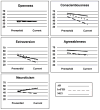Big 5 personality changes in Greek bvFTD, AD, and MCI patients
- PMID: 23060360
- PMCID: PMC3553233
- DOI: 10.1097/WAD.0b013e31826e5504
Big 5 personality changes in Greek bvFTD, AD, and MCI patients
Abstract
Patients with neurodegenerative disease show distinct patterns of personality change, some of which may be traced to focal neurological damage, whereas others may be mediated by cultural reactions to functional impairment. Although such changes are early and pervasive in behavioral variant frontotemporal dementia (bvFTD), and milder changes are seen in Alzheimer disease (AD), no study has examined all Big 5 factors of personality in mild cognitive impairment (MCI) patients. In addition, the influence of culture and ethnicity on disease-related personality changes has seldom been examined. Premorbid and current personality were measured in 47 Greek patients with bvFTD, AD, and MCI on the basis of informant reports using the Traits Personality Questionnaire 5, a 5-factor inventory in the Greek language that accounts for Greek cultural factors. bvFTDs showed greater decreases in conscientiousness compared with ADs and MCIs. ADs and MCIs showed increased neuroticism, whereas the bvFTD patients were rated as having become much less neurotic in the course of their disease. The pattern of personality change in MCIs was very similar to that of ADs, supporting recent evidence that personality changes occur as early as the MCI disease stage. In all the groups, personality changes were similar to those previously described in non-Mediterranean cultures, supporting the hypothesis that they may result directly from disease-specific neurological processes.
Figures
Similar articles
-
The Modified Frontal Behavioral Inventory (FBI-mod) for Patients with Frontotemporal Lobar Degeneration, Alzheimer's Disease, and Mild Cognitive Impairment.J Alzheimers Dis. 2017;56(4):1241-1251. doi: 10.3233/JAD-160983. J Alzheimers Dis. 2017. PMID: 28106561
-
Interpersonal traits change as a function of disease type and severity in degenerative brain diseases.J Neurol Neurosurg Psychiatry. 2011 Jul;82(7):732-9. doi: 10.1136/jnnp.2010.205047. Epub 2010 Dec 15. J Neurol Neurosurg Psychiatry. 2011. PMID: 21172858 Free PMC article.
-
Comparison of Prodromal Symptoms of Patients with Behavioral Variant Frontotemporal Dementia and Alzheimer Disease.Dement Geriatr Cogn Disord. 2020;49(1):98-106. doi: 10.1159/000507544. Epub 2020 Jun 2. Dement Geriatr Cogn Disord. 2020. PMID: 32485711
-
Theory of mind in behavioural-variant frontotemporal dementia and Alzheimer's disease: a meta-analysis.J Neurol Neurosurg Psychiatry. 2015 Jul;86(7):714-9. doi: 10.1136/jnnp-2014-309445. Epub 2015 Jan 16. J Neurol Neurosurg Psychiatry. 2015. PMID: 25595152 Review.
-
The behavioral variant of frontotemporal dementia: An analysis of the literature and a case report.Int J Law Psychiatry. 2016 Jul-Aug;47:157-63. doi: 10.1016/j.ijlp.2016.04.001. Epub 2016 Apr 30. Int J Law Psychiatry. 2016. PMID: 27143117 Review.
Cited by
-
Psychopathology Changes in Alzheimer's Disease.Behav Sci (Basel). 2022 Oct 28;12(11):418. doi: 10.3390/bs12110418. Behav Sci (Basel). 2022. PMID: 36354395 Free PMC article.
-
Is neuroticism differentially associated with risk of Alzheimer's disease, vascular dementia, and frontotemporal dementia?J Psychiatr Res. 2021 Jun;138:34-40. doi: 10.1016/j.jpsychires.2021.03.039. Epub 2021 Mar 25. J Psychiatr Res. 2021. PMID: 33819874 Free PMC article.
-
Meta-analyses of personality change from the preclinical to the clinical stages of dementia.Ageing Res Rev. 2025 Aug 5;112:102852. doi: 10.1016/j.arr.2025.102852. Online ahead of print. Ageing Res Rev. 2025. PMID: 40752776 Free PMC article. Review.
-
Changes in personality traits in patients with Alzheimer's Disease.Dement Neuropsychol. 2022 Apr-Jun;16(2):187-193. doi: 10.1590/1980-5764-DN-2021-0029. Epub 2022 Apr 29. Dement Neuropsychol. 2022. PMID: 35720659 Free PMC article.
-
Premorbid de novo artistic creativity in frontotemporal dementia (FTD) syndromes.J Neural Transm (Vienna). 2021 Dec;128(12):1813-1833. doi: 10.1007/s00702-021-02426-9. Epub 2021 Oct 7. J Neural Transm (Vienna). 2021. PMID: 34618237
References
-
- McCrae RR, Costa PT, Jr, Pedroso de Lima M, Simoes A, Ostendorf F, Angleitner A, Marusic I, Bratko D, Caprara GV, Barbaranelli C, Chae JH, Piedmont RL. Age differences in personality across the adult life span: Parallels in five cultures. Developmental Psychology. 1999;35(2):466–477. - PubMed
-
- Roberts BW, DelVecchio WF. The rank-order consistency of personality traits from childhood to old age: A quantitative review of longitudinal studies. Psychological Bulletin. 2000;126(1):3–25. - PubMed
-
- Roberts BW, Walton KE, Viechtbauer W. Patterns of mean-level change in personality traits across the life course: A meta-analysis of longitudinal studies. Psychological Bulletin. 2006;132(1):1–25. - PubMed
-
- McCrae RR, Terracciano A. Personality profiles of cultures: Aggregate personality traits. Journal of Personality and Social Psychology. 2005;89(3):407–425. - PubMed
-
- Heine SJ, Buchtel EE. Personality: The universal and the culturally specific. Annual Review of Psychology. 2009;60:369–394. - PubMed
MeSH terms
Grants and funding
LinkOut - more resources
Full Text Sources
Other Literature Sources
Medical


